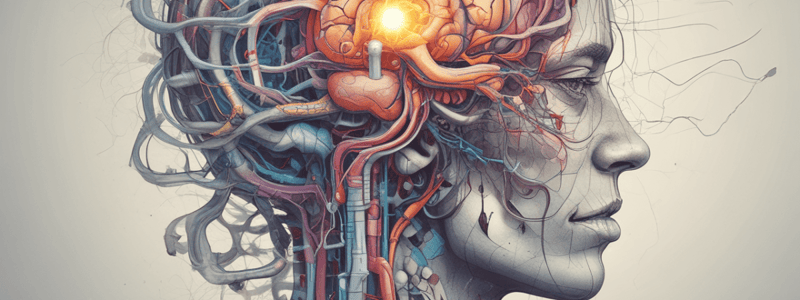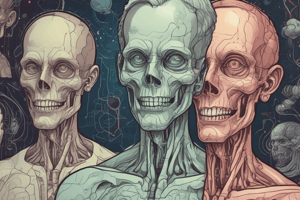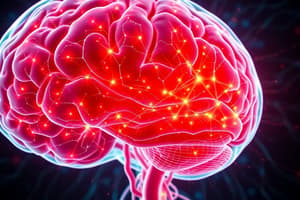Podcast
Questions and Answers
What percentage of employees feel stressed according to the YouGov survey in 2015?
What percentage of employees feel stressed according to the YouGov survey in 2015?
- 29% (correct)
- 17%
- 24%
- 30%
What is the estimated cost to employers of mental health problems in a year?
What is the estimated cost to employers of mental health problems in a year?
- 1.4 billion
- 3.4 billion
- 2.4 billion (correct)
- 4.4 billion
Which nervous system is activated in response to stress?
Which nervous system is activated in response to stress?
- Autonomic Nervous System
- Sympathetic Nervous System (correct)
- Parasympathetic Nervous System
- Central Nervous System
What is the term for the coordinated system that includes the Autonomic Nervous System and the Hypothalamic-Pituitary-Adrenal axis?
What is the term for the coordinated system that includes the Autonomic Nervous System and the Hypothalamic-Pituitary-Adrenal axis?
What is the name of the neurotransmitter released in the neuron terminals when an individual is stressed and anxious?
What is the name of the neurotransmitter released in the neuron terminals when an individual is stressed and anxious?
According to the psychology perspective, what happens when demands exceed a person's resources to cope?
According to the psychology perspective, what happens when demands exceed a person's resources to cope?
What is the term for external or internal events that trigger stress responses?
What is the term for external or internal events that trigger stress responses?
What is the estimated number of work days lost to mental health problems?
What is the estimated number of work days lost to mental health problems?
What is stress defined as?
What is stress defined as?
What is an example of a positive outcome of short-term stress?
What is an example of a positive outcome of short-term stress?
What is a long-term effect of stress?
What is a long-term effect of stress?
What is the primary focus of emotion-focused coping styles?
What is the primary focus of emotion-focused coping styles?
Which of the following is NOT a perspective on stress?
Which of the following is NOT a perspective on stress?
What is the name of the lecture series mentioned in the content?
What is the name of the lecture series mentioned in the content?
Which of the following is NOT a type of stress response?
Which of the following is NOT a type of stress response?
Who is the author of the content?
Who is the author of the content?
What is the main benefit of approach coping in healthcare practice?
What is the main benefit of approach coping in healthcare practice?
What is the topic of the symposium mentioned in the content?
What is the topic of the symposium mentioned in the content?
What is the effect of CBT on physiological outcomes/mortality for people with cardiovascular disease?
What is the effect of CBT on physiological outcomes/mortality for people with cardiovascular disease?
Which of the following is NOT a physical stress management technique?
Which of the following is NOT a physical stress management technique?
What is the purpose of the module lecture content?
What is the purpose of the module lecture content?
What is the primary focus of managing stress from a psychology perspective?
What is the primary focus of managing stress from a psychology perspective?
According to Williams et al. (2019), what is the effect of discrimination on health?
According to Williams et al. (2019), what is the effect of discrimination on health?
What type of stressor is most closely related to the healthcare practice context?
What type of stressor is most closely related to the healthcare practice context?
What is the primary function of the blood-CNS barriers?
What is the primary function of the blood-CNS barriers?
Which of the following is NOT a component of the biopsychosocial model of health?
Which of the following is NOT a component of the biopsychosocial model of health?
What is the primary focus of the symposium 'Pain: an integrated approach from neuroscience, to psychology and social science'?
What is the primary focus of the symposium 'Pain: an integrated approach from neuroscience, to psychology and social science'?
Which of the following is an example of a health-related behavior?
Which of the following is an example of a health-related behavior?
What is the primary function of the ascending and descending pathways in the nervous system?
What is the primary function of the ascending and descending pathways in the nervous system?
Which of the following is NOT a component of the organisation of the nervous system?
Which of the following is NOT a component of the organisation of the nervous system?
What is the primary focus of the 'Science of Society' component of the NBSS lecture series?
What is the primary focus of the 'Science of Society' component of the NBSS lecture series?
Which of the following is an example of a psychological framework for understanding illness-related behaviors?
Which of the following is an example of a psychological framework for understanding illness-related behaviors?
Study Notes
Stress: Perspectives from Neuroscience, Psychology, and Social Science
- Stress can be defined as any type of change that causes physical, emotional, or psychological strain.
- Everyone experiences stress to some degree, but the way you respond to stress makes a big difference to your overall well-being.
Impact of Stress
- Short-term stress can be positive, for example, approaching exam challenges.
- Long-term stress is linked with adverse outcomes such as depression, burnout, and physical illnesses.
- A YouGov survey (2015) revealed 29% of employees feel stressed, 24% anxious, and 17% depressed.
- 70 million work days are lost to mental health problems, costing employers 2.4 billion a year (Mental Health Foundation, 2016).
Neuroscience Perspective
- Stress leads to a biological response in the body, activating the Sympathetic Nervous System (SNS) and Hypothalamic-Pituitary-Adrenal (HPA) axis.
- The Autonomic Nervous System (ANS) is comprised of the SNS and Parasympathetic Nervous System (PNS), which are highly coordinated and physically interconnected.
- The ANS responds to stress by increasing heart rate and releasing noradrenaline.
Psychology Perspective
- Stress occurs when demands are appraised as exceeding a person's resources to cope.
- Stressors can be external or internal events that trigger stress responses, varying in duration and type (acute, chronic, traumatic).
- Stress responses can be cognitive, affective, behavioral, and physiological.
- Coping styles can be emotion-focused (reducing distress) or problem-focused (dealing with the problem).
- Approaching coping (proactive strategies) is more effective than avoidant coping in healthcare practice.
Managing Stress
- Reducing arousal to stressors and enhancing coping styles can manage stress.
- Physical approaches include mindfulness, relaxation exercises, and physical activity.
- Psychological approaches include psychoeducation, Cognitive Behavior Therapy (CBT), and evidence suggests CBT has moderate effect sizes across different settings.
- CBT is effective for improving mood in people with cardiovascular disease, but its effects on physiological outcomes and mortality are mixed (Cochrane Review, 2014).
Social Science Perspective
- Race, discrimination, and health are interconnected, with discrimination affecting health outcomes.
- The biopsychosocial model of health and stress takes into account biology, psychology, and social factors.
Lecture Series Overview
- The lecture series covers neuroscience, behavior, and social science topics, including pain, stress, and the biopsychosocial model of health.
- Specific topics include the cellular structure of the nervous system, organization of the nervous system, and the science of behavior and society.
Studying That Suits You
Use AI to generate personalized quizzes and flashcards to suit your learning preferences.
Related Documents
Description
Explore the concept of pain through an interdisciplinary approach, combining neuroscience, psychology, and social science. This lecture series covers the complexities of pain from multiple perspectives.



